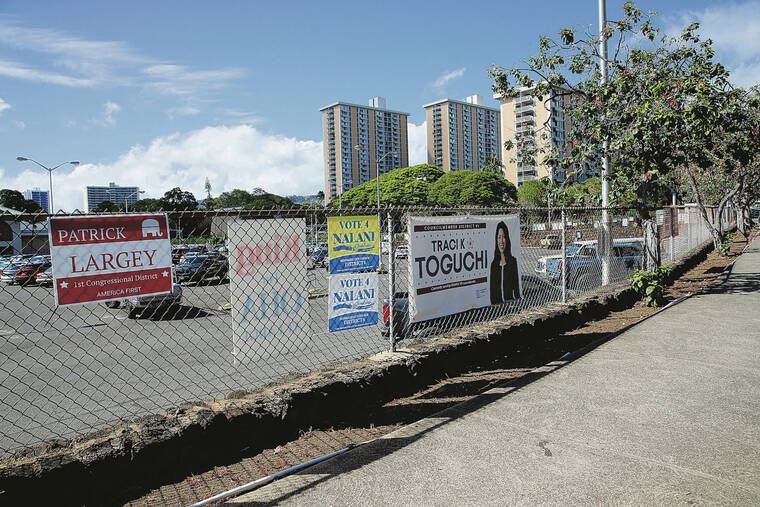
Mahalo for supporting Honolulu Star-Advertiser. Enjoy this free story!
Ten state legislators are running unopposed and will automatically be reelected in November, while another 15 candidates face no internal party challengers and will automatically go on to the November general election.
The pattern follows a trend in recent elections when double-digit numbers of races had zero or little challenge.
But this year’s phenomenon comes as all 25 Senate and 51 House seats are up for election following widespread outrage over the federal guilty pleas of former state Sen. J. Kalani English and former state Rep. Ty J.K. Cullen for bribery and political corruption. That was followed by the Legislature’s failure last session to respond with meaningful reforms aimed at clamping down on violations of ethics rules and campaign fundraising and spending.
But political analyst Neal Milner said it’s difficult for a challenger to win with a singular focus, including corruption reform.
“Corruption is overrated as an issue,” Milner said. “It’s hard to run generally as a single-issue candidate. It gets a lot of attention if you run on corruption and you run on change. It sounds good but it’s not a winner. It’s like having a tool kit with only one screwdriver in it.”
The lack of competitive races also follows this year’s departures of Republican Reps. Bob McDermott (Ewa Beach-Iroquois Point), who is running for U.S. Senate, and Val Okimoto (Mililani-Mililani Mauka-Waipio Acres), who is running for the nonpartisan City Council.
At the same time, two of the incumbents with no opposition are Republicans: state Sen. Kurt Fevella (Ewa Beach-Iroquois Point), the lone Republican in the Senate, and state Rep. Gene Ward (Hawaii Kai-Kalama Valley), one of only two Republicans in the House.
State Rep. Lauren Cheape Matsumoto (Mililani-Schofield-Kunia) has no challenger in the Republican primary Aug. 13.
But Matsumoto will face off in the Nov. 8 general election against the lone Democrat in the race, Marilyn Lee. Lee represented the old House District 36 seat for 16 years before she was defeated in 2012, and unsuccessfully ran two more times before making her third attempt this year.
Colin Moore, director of the University of Hawaii’s Public Policy Center, said Republicans have actually seen progress in recruiting candidates, compared with the past few elections.
But it’s still difficult to find significant challengers in a state dominated by Democrats — even among Democratic challengers.
“The chances of success are so low,” Moore said, “so it’s just very rare that you have a serious challenge against an incumbent. It’s not that we don’t have enough good candidates, but some don’t want to put their families through it. It’s also difficult to attract the money you need, and special interests don’t want to challenge an incumbent. And it also speaks to the failures in our public financing structure.”
For years there has been talk and hope of a new voting block of progressive Democrats getting elected to the Legislature, Moore said, but that’s even hard for serious Democratic challengers taking on an incumbent.
“There are good young candidates, but there’s not a lot of success,” Moore said. “Any time an incumbent loses, it’s sort of shocking because it’s so rare.”
House and Senate seats have new boundaries after reapportionment this year, and many have new district numbers.
So it’s particularly striking how close House Speaker Scott Saiki’s reelection hopes could be in the Democratic primary in his rematch against former Board of Education member Kim Coco Iwamoto.
Saiki, who has served in the House for 28 years, beat Iwamoto in the 2020 primary by just 167 votes.
Saiki’s district has since been redrawn with a greater focus on Ala Moana and Kakaako, which have seen an influx of new and younger voters who will determine whether Saiki wins reelection or the House gets overhauled with new political leadership.
Aside from the Saiki-Iwamoto Democratic primary and a handful of other potentially close races, Milner called this year’s overall election picture “business as usual.”
The phenomenon of reelecting incumbents in state houses across the country is increasingly common with partisan gerrymandering favoring one party over the other.
“State House and Senate district seats have become increasingly more one-power,” Milner said. “In Hawaii you can’t get much more one-party. It’s a historical, structural fact in Hawaii that the state is Democratic, so it’s hard to come up with challengers.”
But the same advantages that Democratic incumbents enjoy also applies to Fevella and Ward, Milner said.
So for Republicans, he said, “you’ve got to start somewhere.”
Ward has served 12 terms representing his Republican-leaning Hawaii Kai House seat.
But Ward quotes John F. Kennedy and interrupted his time in the Legislature to answer Kennedy’s call for public service by joining the Peace Corps for eight years, returning to office in 2006.
He’s particularly happy that more and more Native Hawaiians and candidates with part-Hawaiian blood are running for office this year.
At the same, Ward is humbled that no one is challenging him and that he will return to the Legislature for the 2023 session.
But he’s also troubled by the continuing trend of noncompetitive races.
Still, he sees hope.
“It does seem like there were more ‘no opponents’ (races) in the last two elections,” Ward said. “So that’s something.”
Source: Star Ads



